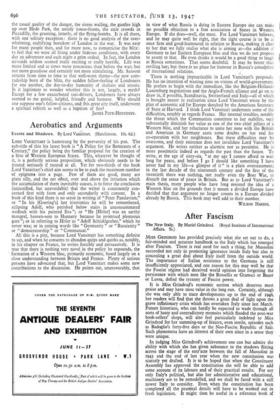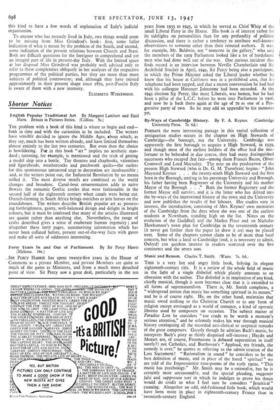After Fascism
MISS GRINDROD has provided precisely what she set out to do, a fair-minded and accurate handbook to the Italy which has emerged after Fascism. There is real need for such a thing, for Mussolini succeeded not only in promoting ignorance inside Italy but also in concealing a great deal about Italy itself from the outside world. The importance of Italian resistance to the Germans is still insufficiently appreciated, and one reason for this may well be that the Fascist regime had deceived world opinion into forgetting the persistence with which men like the Rossellis or Gramsci or Bauer or Lussu, defied the tyranny of Fascist power.
It is Miss Grindrc‘i's economic section which deserves most praise and may have most value in the long run. Certainly, although she was only able to trace developments up to the end of 1946, her readers will find that she throws a great deal of light upon the grave inflationary crisis which has overtaken Italy since last March. Future historians, who can hardly be expected to wade through all sorts of hasty and contradictory memoirs which flooded the post-war book-sellers' shops, will also feel particularly indebted to Miss Grindrod for her summing-up of bizarre, even sterile, episodes such as Badoglio's forty-five days or the Neo-Fascist Republic of Salo. Such phenomena have an interest of their own since in a sense they were unique.
In judging Miss Grindrod's achievement one can but admire the ability with which she has given substance to the shadows flitting across the stage of the entr'acte between the fall of Mussolini in 1943 and the end of last year when the new constitution was scarcely yet drafted. It is to be hoped that when the Constituent Assembly has approved the constitution she will be able to add some account of its labours and of their practical results. For not only Italy's political, but also her administrative and educational, machinery are to be remodelled, and we shall be faced with a still newer Italy to consider. Even when the constitution has been completed all the practical details will have to be worked out in fresh legislation, It might then be useful in a reference book of
this kind to have a few words Of 'explanation of Italy's judicial organisation.
To anyone who has recently lived in Italy, two things would seem to be missing from Miss Grindrod's book : first, some fuller indication of what is meant by the problem of the South, and second, some indication of the present relations between Church and State. Both are difficult questions for the foreigner to comprehend and yet an integral part of life in present-day Italy. With the limited space at her disposal Miss Grindrod was probably well advised only to refer to these complexities obliquely in her analyses of the respective programmes of the political parties, but they are more than mere subjects of political controversy; and, although they have existed approximately in their present shape since 1870, post-Fascist Italy is aware of them with a new intensity.
ELIZABETH WISKEMANN.



































 Previous page
Previous page